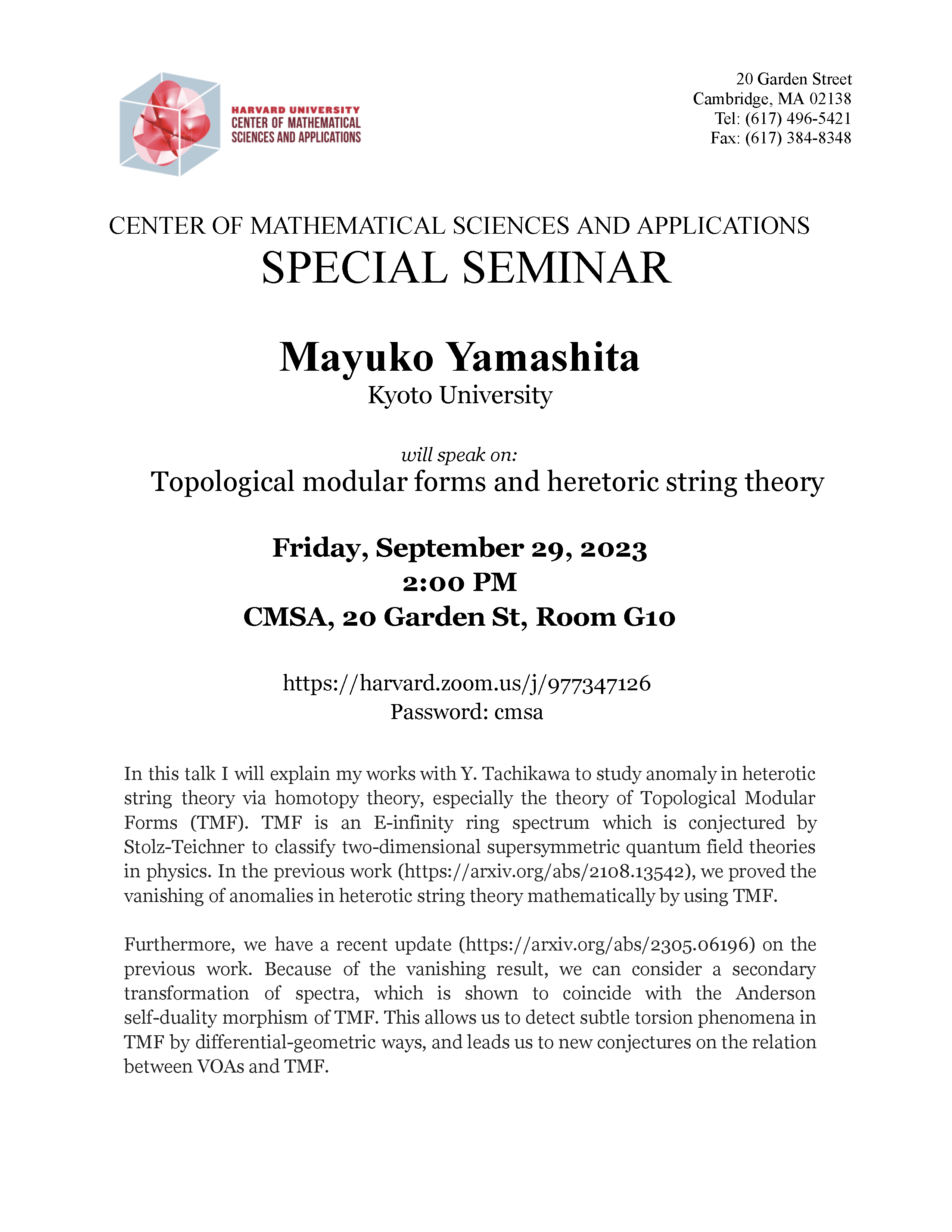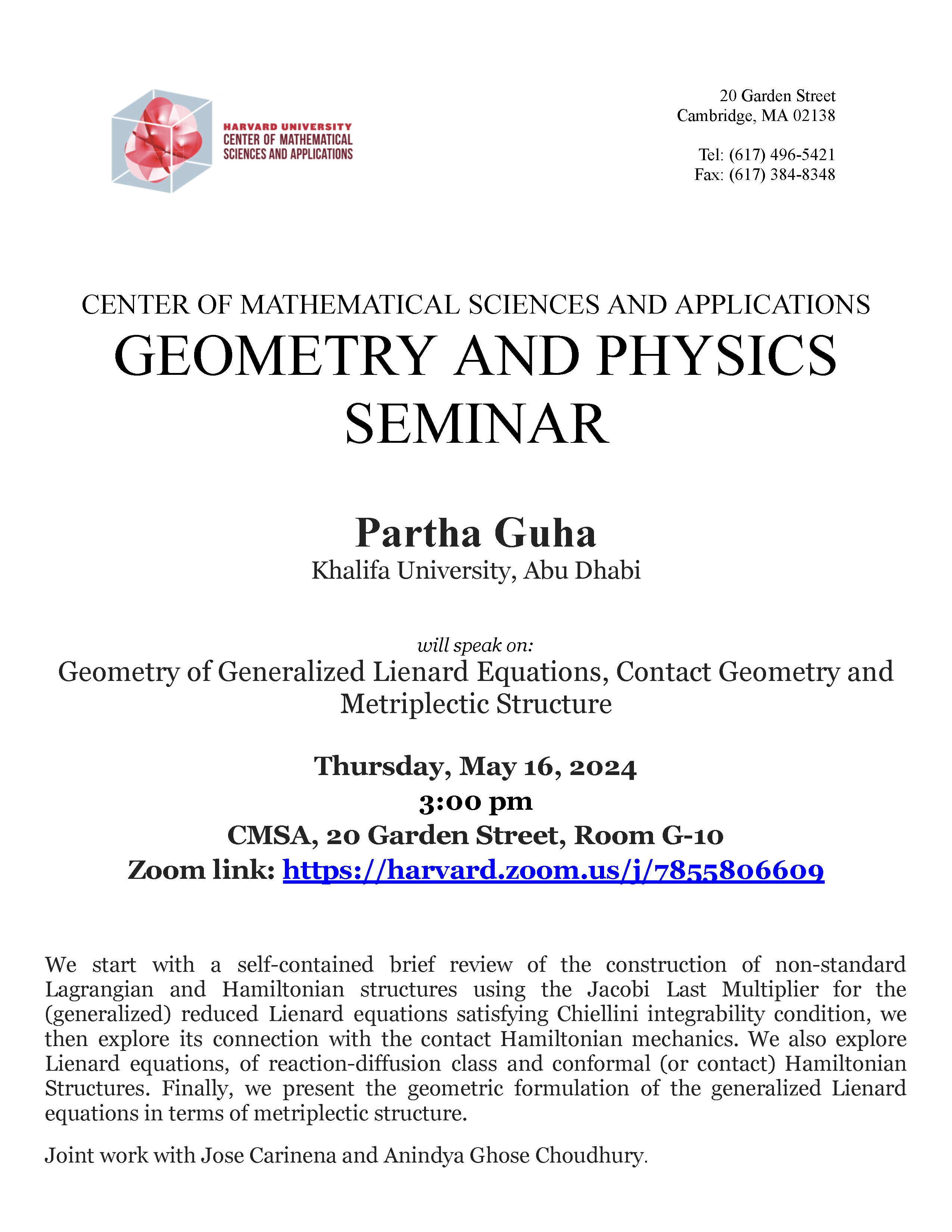The CMSA Special Seminar occurs periodically.
5/23/2017 CMSA Special Seminar
CMSA Room G10 CMSA, 20 Garden Street, Cambridge, MA, United StatesSpecial Lecture Series on Derived Algebraic/Differential Geometry
In the Spring 2019 Semester, the CMSA will be hosting a special lecture series on Derived algebraic/differential geometry run by Artan Sheshmani, with lectures given by Prof. Sheshmani and Dr. Dennis Borisov. The seminar will be held on Tuesdays and Thursdays from 3:00-4:30pm in CMSA, room G10. Click here for reference material Click here for […]
Gromov-Witten/Donaldson Thomas theory and Birational/Symplectic invariants for algebraic surfaces
VirtualDuring the Spring 2021 Semester Artan Sheshmani (CMSA/ I.M. A.U.) will be teaching a CMSA special lecture series on Gromov-Witten/Donaldson Thomas theory and Birational/Symplectic invariants for algebraic surfaces. In order to attend this series, please fill out this form. The lectures will be held Mondays from 8:00 – 9:30 AM ET and Wednesdays from 8:00 – 9:00 AM ET beginning January 25 on […]
Macroscopic properties of buyer-seller networks in online marketplaces
Abstract: Online marketplaces are the main engines of legal and illegal e-commerce, yet the aggregate properties of buyer-seller networks behind them are poorly understood. We analyse two datasets containing 245M transactions (16B USD) between 2010 and 2021 involving online marketplaces: 28 dark web marketplaces (DWM), unregulated markets whose main currency is Bitcoin, and 144 product […]
On the wave turbulence theory for a stochastic KdV type equation
CMSA Room G10 CMSA, 20 Garden Street, Cambridge, MA, United StatesRandom Matrix & Probability Theory Seminar Speaker: Minh-Binh TRAN (SMU & MIT) Location: CMSA, Room G02 Title: On the wave turbulence theory for a stochastic KdV type equation Abstract: We report recent progress, in collaboration with Gigliola Staffilani (MIT), on the problem of deriving kinetic equations from dispersive equations. To be more precise, starting from the stochastic […]

Topological modular forms and heretoric string theory
CMSA Room G10 CMSA, 20 Garden Street, Cambridge, MA, United StatesSpecial Seminar Speaker: Mayuko Yamashita, Kyoto University Title: Topological modular forms and heretoric string theory Abstract: In this talk I will explain my works with Y. Tachikawa to study anomaly in heterotic string theory via homotopy theory, especially the theory of Topological Modular Forms (TMF). TMF is an E-infinity ring spectrum which is conjectured by […]

Geometry of Generalized Lienard Equations, Contact Geometry and Metriplectic Structure
CMSA Room G10 CMSA, 20 Garden Street, Cambridge, MA, United StatesSpeaker: Partha Guha, Khalifa University, Abu Dhabi Title: Geometry of Generalized Lienard Equations, Contact Geometry and Metriplectic Structure Abstract: We start with a self-contained brief review of the construction of non-standard Lagrangian and Hamiltonian structures using the Jacobi Last Multiplier for the (generalized) reduced Lienard equations satisfying Chiellini integrability condition, we then explore its connection […]

Corks for exotic diffeomorphisms
CMSA 20 Garden Street, Cambridge, MA, United Stateshttps://youtu.be/HWL5Rg9B624 Speaker: Slava Krushkal, University of Virginia Title: Corks for exotic diffeomorphisms Abstract: Exotic smooth structures on simply-connected 4-manifolds are known to be related by cork twists: cutting out and re-gluing certain smooth contractible submanifolds. Work in progress, joint with A. Mukherjee, M. Powell, and T. Warren, provides a localization result for exotic diffeomorphisms of 4-manifolds. I will also discuss applications […]

Can embedding problems be used to distinguish S^4 from other (possible) homotopy 4-spheres?
CMSA 20 Garden Street, Cambridge, MA, United Stateshttps://youtu.be/18eVp3fOh-4 Speaker: Michael Freedman, Harvard CMSA Title: Can embedding problems be used to distinguish S^4 from other (possible) homotopy 4-spheres? Abstract: There are approaches in the literature (using Khovanov homology) to detecting a homotopy 4-sphere, via the 4-ball genus of knots. I'd like to suggest moving from surfaces to 3-manifolds, that is approaching the problem […]

Quantum Cellular Automata
CMSA Room G10 CMSA, 20 Garden Street, Cambridge, MA, United StatesSpecial Seminar Speaker: Jeongwan Haah, Stanford University Title: Quantum Cellular Automata Abstract: A discrete time evolution on lattice systems that has a notion of lightcone is called a quantum cellular automaton. Lattice translation in 1D is a well-known example of QCA that is nontrivial in the sense that it is not a local Hamiltonian evolution. […]
